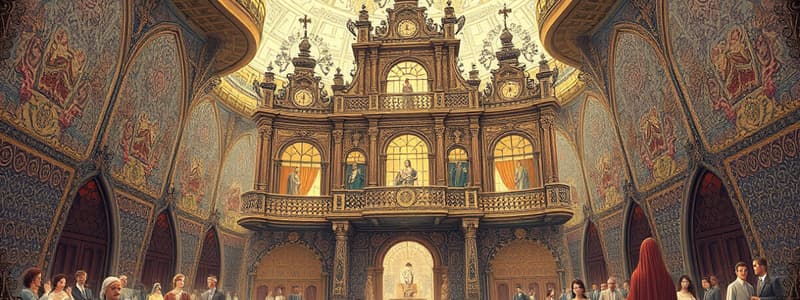Podcast
Questions and Answers
What was the primary purpose of the social contract according to John Locke?
What was the primary purpose of the social contract according to John Locke?
- To promote economic involvement by the government
- To facilitate obedience in exchange for protection (correct)
- To establish a monarchy
- To define natural rights
Which rights did John Locke identify as natural rights?
Which rights did John Locke identify as natural rights?
- Rights to happiness, wealth, and friendship
- Rights to life, liberty, and property (correct)
- Rights to freedom of speech, assembly, and press
- Rights to education, healthcare, and shelter
What was Montesquieu's view on governmental power?
What was Montesquieu's view on governmental power?
- It should be centralized within a single entity
- It should be distributed among various entities (correct)
- It should be based solely on public opinion
- It should focus strictly on the legislative branch
Which contribution is attributed to Voltaire?
Which contribution is attributed to Voltaire?
What was Denis Diderot's primary role concerning the Encyclopedia?
What was Denis Diderot's primary role concerning the Encyclopedia?
According to Jean-Jacques Rousseau, what should happen if the government fails its duties?
According to Jean-Jacques Rousseau, what should happen if the government fails its duties?
What economic principle is Adam Smith known for advocating?
What economic principle is Adam Smith known for advocating?
Which of the following statements reflects the views of Voltaire regarding religious practices?
Which of the following statements reflects the views of Voltaire regarding religious practices?
Flashcards are hidden until you start studying
Study Notes
John Locke
- Originator of the concept of the "social contract."
- Authored "Two Treatises of Government" in 1689.
- Defined the social contract as an agreement between individuals and government.
- Individuals consent to give up certain freedoms in exchange for government protection of their rights and order.
- Emphasized three natural rights:
- Right to life
- Right to liberty
- Right to property
Montesquieu
- Advocated for the separation of powers within government.
- Wrote "The Spirit of the Laws."
- Identified three branches of government:
- Legislative: responsible for making laws
- Executive: responsible for enforcing laws
- Judicial: responsible for interpreting laws
- Proposed a system of checks and balances among branches to prevent abuse of power.
Denis Diderot
- Coordinated the creation of the Encyclopedia.
- Aimed to compile all available knowledge to promote social progress.
Voltaire
- Renowned for advocating the separation of church and state.
- Asserted that government should protect individuals while religion should remain separate and confined to its own domain.
- Promoted religious tolerance and flexibility in religious practices.
- Listed on the Index Librorum Prohibitorum, denoting condemnation of his works by the church.
Jean-Jacques Rousseau
- Expanded on Locke's social contract idea, asserting that if the government fails to fulfill its obligations, the people have the right to replace it.
Adam Smith
- Author of "The Wealth of Nations" published in 1776.
- Introduced the concept of laissez-faire economics, arguing for minimal government intervention in the economy.
- Advocated that the government's role should be limited to ensuring conditions for production, allowing individuals to make economic decisions.
Studying That Suits You
Use AI to generate personalized quizzes and flashcards to suit your learning preferences.




